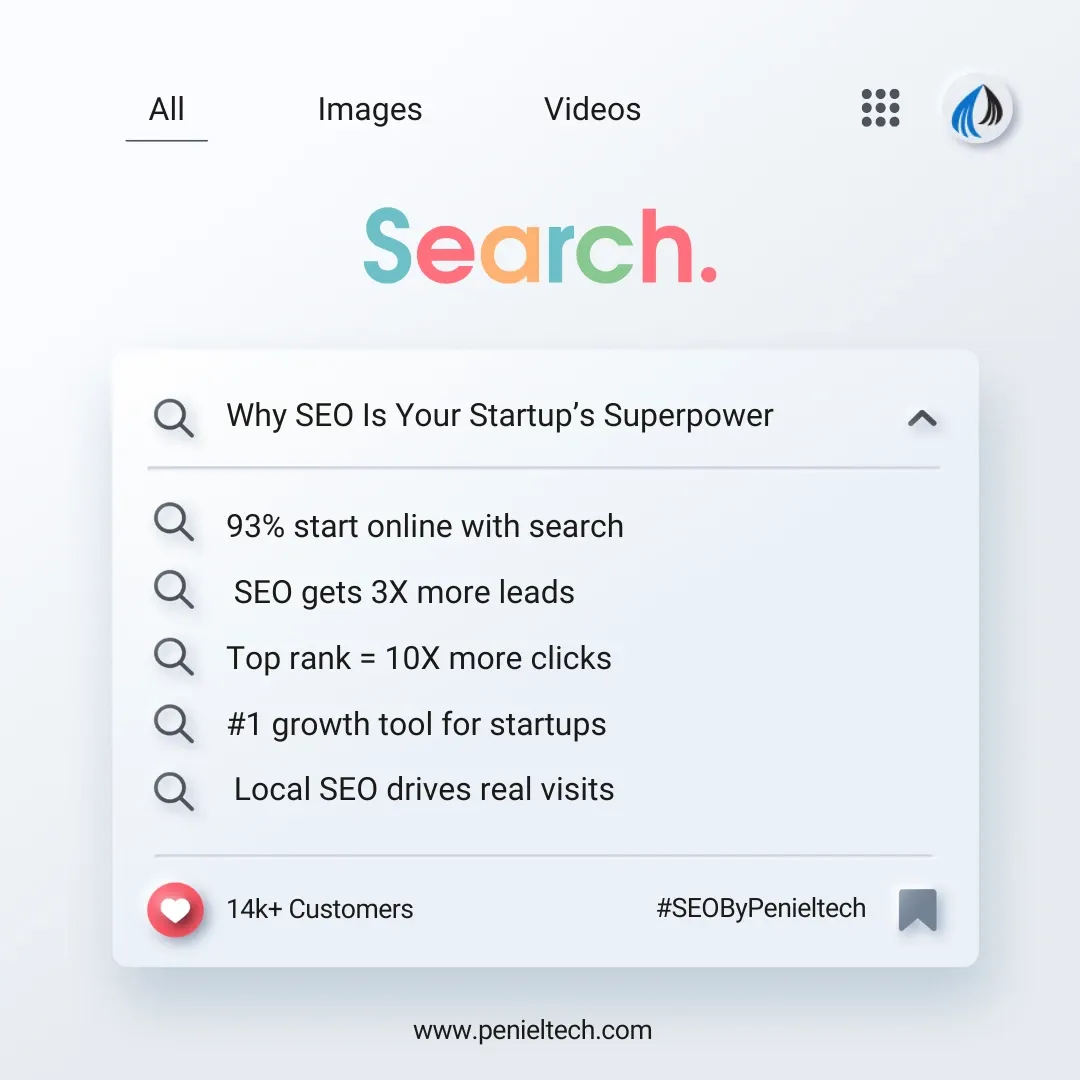Your Startup’s Secret Weapon: Smart SEO Services
Startups don’t get the luxury of waiting because there’s a lot to find out when you launch a startup. From the very beginning, you need to concentrate on funding, hiring, product development, owning a place, and more. But in this chaos, one thing that often gets sidelined is getting found online. They forget that this is their way to be seen, to be trusted, and to be chosen fast.

In 2025, if people can't find you on search engines, you’re probably invisible to them. This visibility doesn’t happen by chance; it’s engineered. Here comes SEO Services, the most sustainable way to do that.
If you can do it right, it’ll make people find you way before they find your competitors.
The Benefits of SEO for Startups
Most of the startups usually enter the market where others already exist. So, in the first few months or years, you’re trying to prove that your product is valuable, along with your existence.
Here’s what Digital marketing services can unlock for your startup:
1. Visibility Where It Actually Counts
Ranking on Google doesn’t mean someone scrolls mindlessly and finds you. It means you’re showing up when someone is already searching for your product or service.
2. Trust Without Pitching
People trust what they search for. If your startup shows up among credible sources, you gain authority automatically without even saying a word.
3. Cost-Effective Lead Generation
Compared to paid ads, SEO has a compounding return. One great page can bring in leads for months or years without paying a fortune.
4. Data You Can Build On
Boost Your Search Rankings
Improve your visibility on Google and attract more qualified traffic with proven SEO techniques.
SEO tools give you real insights into what your market cares about, what they search, how they behave, and where they drop off.
5. Organic Traffic Brings Better Leads
Leads that find you through search are more likely to convert, because they came looking, not because you interrupted them.
In this way, you’re not chasing your customers; rather, you’re helping them to find you by themselves, and that’s a different level of leverage altogether.
Understand How Search Engines Actually Work
Before optimizing anything, it is salient to understand what you’re optimizing for. Search engines like Google have one job: Deliver the most relevant and reliable content to the user, as fast as possible.
So they look at things like:
- How well does your content match the search query?
- How fast does your site load?
- How well is your content structured?
- How many reputable sites link back to you?
- How long do users stay on your pages?
SEO is simply the process of aligning your website with how search engines measure value.
The Building Blocks of a Startup SEO Strategy
Startups don’t need complicated frameworks. They just need clarity and execution.
Here's where to start:
1. Build the Right Website Foundation
Before you chase traffic, make sure your site’s not working against you. Here’s what a solid SEO foundation looks like:
A. Fast Loading Speed
Startups can’t afford slow sites. Every extra second costs credibility. Use:
- Google PageSpeed Insights.
- Compress images.
- Avoid bloated themes.
B. Mobile Optimization
Most users come from mobile because they don’t waste their energy opening a desktop. That’s why your site should look clean and load fast on every screen.
C. Clean Structure
Use clear navigation, internal linking, and user-friendly URLs. Nowadays, nobody wants to click a mystery button.
2. Start With Technical SEO
Technical SEO keeps your site clean and indexable. Without it, your content might never rank, no matter how amazing your product is.
Fix the basics:
- Submit your XML sitemap to Google Search Console.
- Secure your site with HTTPS.
- Use Proper meta description.
Drive More Leads & Sales
Convert visitors into loyal customers with smart, data-driven SEO strategies tailored for startups.
- Use proper URL structures.
- Remove duplicate pages.
- Fix broken links and crawl errors.
In this way, Google and other search engines can recognize your site properly and improve the user experience of your site. So ultimately, you can achieve the goal of keeping people on your page as long as possible, and a better SEO agency can assist you in this process.
3. Keyword Research Is Non-Negotiable
Most of you still think that keyword research means stuffing in the words people type into Google. Well, there’s more than just that. Instead, think like your user.
- What are they asking?
- What problems are they trying to solve?
You can use these tools to gather real data:
- Google Keyword Planner
- Ahrefs
- Ubersuggest
Focus on a mix of:
- Short-tail keywords.
- Long-tail keywords.
- Branded keywords.

Make sure your target keywords are naturally woven into:
- Page titles
- Meta descriptions
- Headers (H1, H2, etc.)
- Body content
- Image alt text
- URL slugs
But remember, don’t stuff them unnaturally because you’re writing for humans, not crawlers.
4. On-Page SEO
Every aspect of a good on-page SEO isn’t visible; it just feels easy to read and navigate.
Structure matters:
- Use clear headings (H1 for titles, H2/H3 for subtopics).
- Break long paragraphs into readable chunks.
- Use bullets, lists, and tables for scannability.
- Add internal links to other pages on your site.
- Optimize images (size + alt text).
Overall, on-page SEO is how you make your content digestible, both for users and for Google.
5. Off-Page SEO
When you start fresh, it’s not possible to gain trust from your potential customers and Google easily. To earn that trust, you must focus on off-page SEO because backlinks are a big part of that.
Here’s how to start building quality backlinks:
- Guest post on industry blogs.
- Get listed in startup directories.
- Build partnerships with relevant sites.
- Get featured in roundups or local press.
And most importantly, avoid shortcuts. Buying links or using shady tactics may give you a bump, but they can sink your site just as fast.
A good SEO company won’t offer thousands of links in a week; they’ll help you earn the right links over time.
6. Local SEO
If your startup is targeting customers in any specific location, then local SEO is way more salient for you than you can even imagine.
You can use these tactics:
- Create and optimize a Google Business Profile.
- Add your business to local directories.
- Add your full NAP (Name, Address, Phone) on your site.
- Get local backlinks.
- Use location-specific keywords.
Basically, local SEO helps your business to show up in “near me" and map-based searches, which are really valuable for any startup.
7. Create Content that Deserves to Rank
Google doesn’t rank content just because it’s long. It ranks the contents that are actually able to solve problems. So startups should focus on building a content library that speaks directly to their audience. Remember, you’re not writing just for algorithms. You’re writing for humans who might become your paying customers.
Here’s what works:
- Guides: Detailed guides that can answer their questions.
- Case Studies: Real success stories with actual numbers.
- How-To Blogs: Solve a problem, step-by-step
- Comparisons: Help users choose what they want (Focus on your product more).
Post consistently, but each piece should have a clear goal, including rank for a keyword, convert a user, or educate your market.
Don’t Ignore Social Signals
Social media doesn’t directly improve your website rankings, but it amplifies your content. Every share brings you closer to a backlink, and every comment builds authority.
Outrank Your Competitors
Stay ahead in your industry by dominating search results with our expert SEO services.
So:
- Share new content on LinkedIn, X (Twitter), and Instagram.
- Engage with communities.
- Collaborate with micro-influencers.
Apart from that, focus on Email marketing, PPC campaigns, better web designs, and content marketing because the game is all about showing up where your audience already hangs out.
Now we know that SEO for startups isn’t a trick, it’s an entire system. And like any other system, it rewards consistency, not shortcuts.
However, you don’t need a big team to achieve this. What you need is clear goals, the right tools, a strong message, and an experienced digital marketing company.
FAQs
1. What are Long-Tail Keywords?
Simply, long-tail keywords are multi-word but specific terms that users often type into search engines. They might be long and less common, but they have a better conversion rate.
2. What are Short-Tail Keywords?
It’s basically a general search term. It mainly consists of one or two words but covers broader topics. Short-tail keywords often cause intense competition and make the content hard to rank. But it can increase your brand visibility surprisingly if used properly.
3. As a startup, what should I use, long-tail or short-tail?
Start with long-tail. Every time. They work better when you don’t have a massive budget. Yes, they're slower volume-wise, but smarter if you're playing it lean and strategic.
4. Do I really need a blog to win at SEO?
If you’re serious about organic traffic, then yes. That’s where the real SEO happens. Helpful and direct articles that answer your audience actually rank in Google.
5. Can I manage SEO without an agency?
In the beginning, maybe yes, because tools and tutorials are out there. But if SEO starts eating into your build time or brain space, it’s probably smarter to let a proper digital marketing company handle it.
